Key takeaways:
- Author collaborations enhance educational content by combining diverse perspectives and expertise, leading to richer narratives and innovative approaches.
- Successful collaborations rely on strong communication, trust, and mutual respect for each other’s skills, which fosters creativity and effective idea exchange.
- Setting clear expectations and adapting communication styles can significantly improve collaboration dynamics, ensuring accountability and minimizing misunderstandings.
- Personal values like trust, respect, and shared passion are vital for creating an empowering and productive collaborative environment.
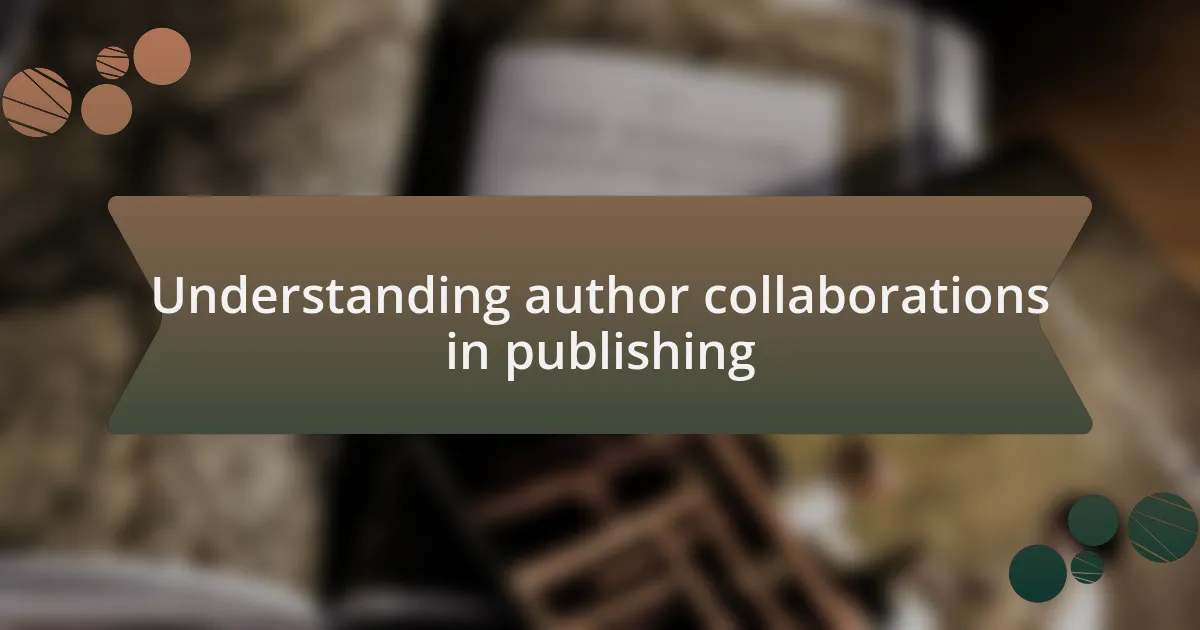
Understanding author collaborations in publishing
Author collaborations in publishing can be incredibly dynamic and enriching. I vividly remember a project I worked on with fellow educators where our different expertise brought a unique depth to our work. It was fascinating to witness how our varied perspectives shaped the narrative—something I believe is often underestimated in the collaborative process. Have you ever thought about how much richer a text becomes when multiple voices and experiences contribute to it?
Understanding these collaborations goes beyond teamwork; it’s about harmonizing different ideas to create something truly special. When authors work together, they draw on each other’s strengths, often leading to innovative approaches that resonate with diverse audiences. In my experience, the synergy that emerges can elevate the final product, making it more engaging and impactful.
However, navigating the challenges of collaboration can be tricky. I once faced a situation where differing opinions almost derailed a project. It took open communication and a commitment to compromise to ensure our vision didn’t get lost. Isn’t it fascinating how both tension and triumph can coexist in a collaborative environment? It’s this complex dance of relationships that ultimately shapes the quality of our educational publications.
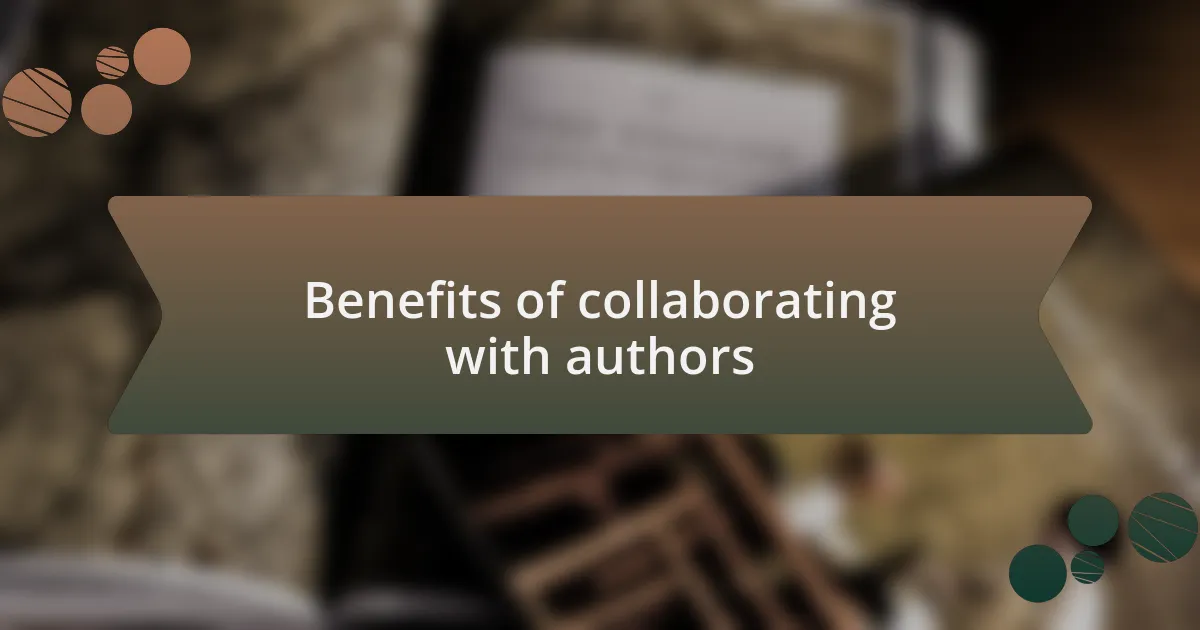
Benefits of collaborating with authors
Collaborating with other authors can significantly enhance the richness of educational content. For instance, I once teamed up with a historian and a scientist to create an interdisciplinary textbook. The result was beyond anything I could have imagined; not only did we incorporate diverse methodologies, but our combined insights attracted a broader readership. Have you ever experienced the thrill of watching a project blossom into something larger than your original vision?
Moreover, teamwork often leads to increased creativity and innovation. I recall a brainstorming session where we tossed around ideas for a teaching strategy that combined storytelling with scientific principles. This fusion led us to develop an engaging narrative framework that made complex concepts accessible. Isn’t it fascinating how collaboration can push us beyond our comfort zones and spark unexpected ideas?
Lastly, author collaborations can also foster professional growth. Through my partnerships, I’ve gained invaluable feedback and honed my own writing skills. One colleague pointed out simple yet effective ways to improve clarity in my work, which I initially resisted. Reflecting on it now, I realize that such constructive criticism is crucial for growth. How often do we overlook the fact that collaboration not only enhances our projects but also shapes us as professionals?
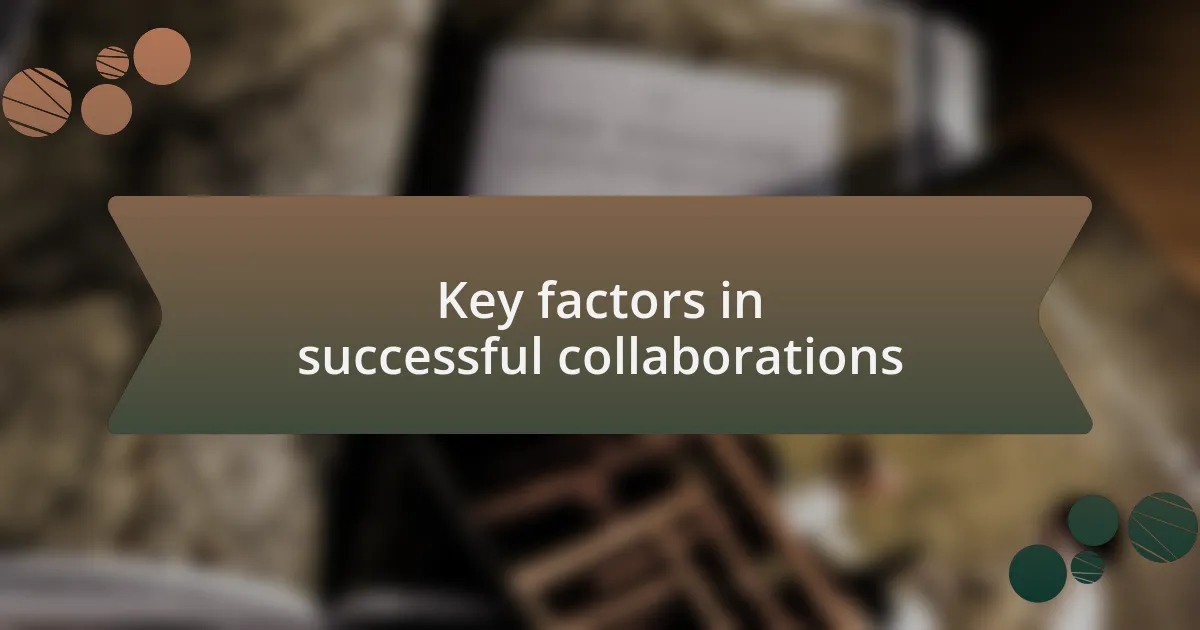
Key factors in successful collaborations
Creating successful collaborations hinges on strong communication. In one project, I partnered with an author who had a vastly different approach to writing. Initially, we struggled to align our ideas, but through open dialogue and regular check-ins, we found common ground. Have you ever realized just how vital it is to speak candidly in a partnership? It transforms a good collaboration into something exceptional.
Trust is another cornerstone of fruitful collaborations. I remember collaborating with a fellow educator who was hesitant about sharing her drafts. As we exchanged feedback, I demonstrated my commitment to her vision, which eventually encouraged her to be more open. Isn’t it interesting how establishing trust can lead to a more honest exchange of ideas? I’ve found that once trust is established, the collaboration flourishes, and the project becomes a true reflection of our combined strengths.
Lastly, mutual respect for each other’s expertise can make all the difference. During a recent collaboration, I worked alongside an author skilled in digital education tools. Instead of feeling overshadowed by her expertise, I embraced the opportunity to learn from her. How often do we acknowledge the unique value each collaborator brings? I believe recognizing and appreciating these strengths creates an atmosphere where innovation thrives, ultimately elevating the quality of our work.
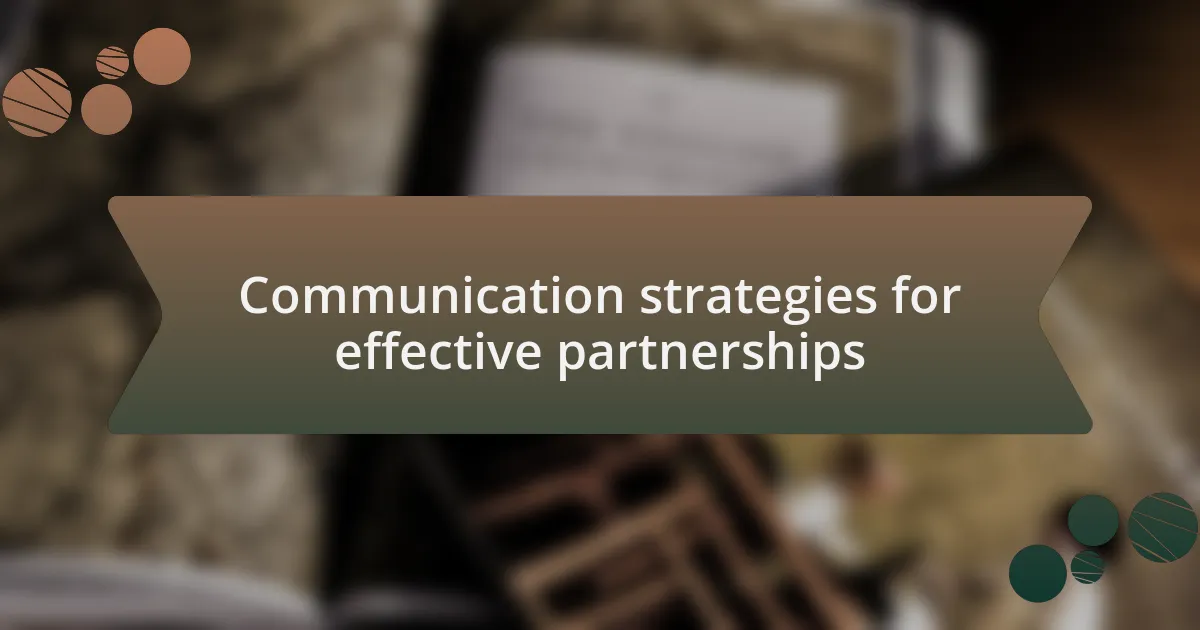
Communication strategies for effective partnerships
Strong communication strategies are essential for effective partnerships. In one collaboration, I made it a point to set aside time for brainstorming sessions. These meetings transformed from mere obligations into energizing exchanges full of ideas. I still recall how exciting it was when my partner and I bounced ideas off each other, leading to breakthroughs we never anticipated. Have you ever experienced that rush when conversation flows freely? It’s invigorating!
Another strategy I find invaluable is adapting communication styles. I once worked with an author who preferred detailed emails over impromptu calls, while I leaned toward real-time brainstorming. By adjusting my approach and embracing her preferences, we cultivated a smoother dialogue and minimized misunderstandings. Isn’t it fascinating how simply being attuned to each other’s communication styles can bridge gaps and enhance collaboration? Understanding each other’s needs creates a comforting environment that fosters creativity.
Moreover, setting clear expectations upfront can save a lot of headaches down the line. In a previous project, my co-author and I defined specific roles and deadlines right at the start. This proactive clarity reduced confusion and helped us hold each other accountable. Have you ever wondered how clarity can shift the dynamics of a collaboration? I’ve learned that when everyone knows their responsibilities, the partnership flows more seamlessly, allowing us to focus on our shared goals.
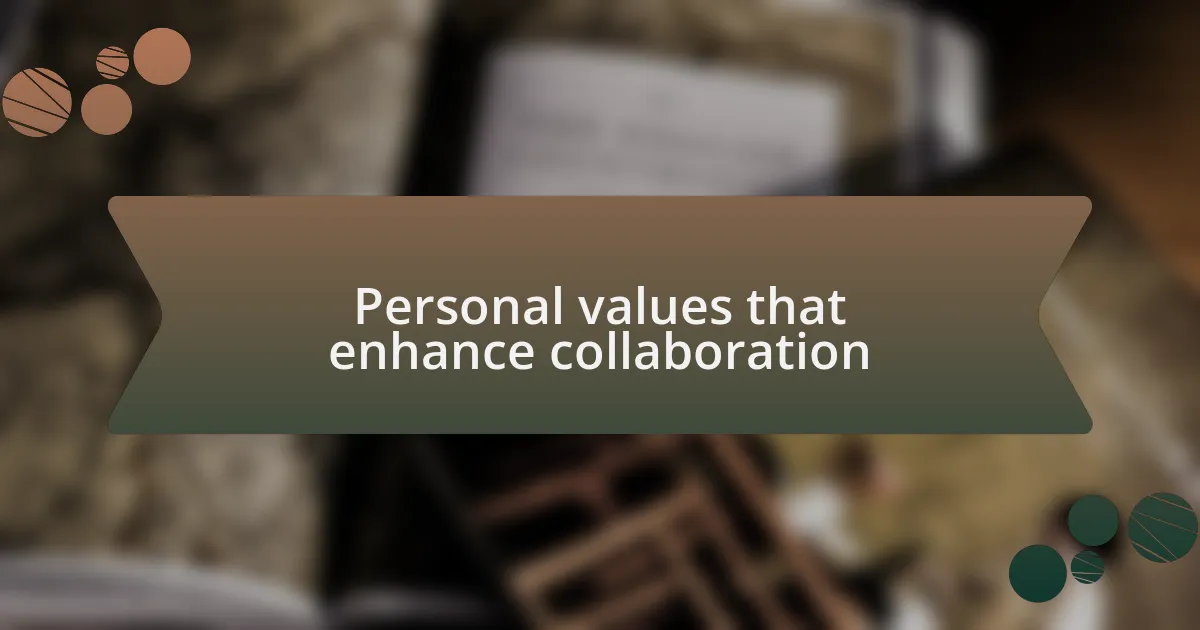
Personal values that enhance collaboration
In my experience, trust is a cornerstone of successful collaboration. I remember once teaming up with a fellow author on a project where we had to share our drafts openly. Initially, I felt hesitant to expose my thoughts, fearing judgment. However, as I realized my partner trusted my insights and assessments, I felt empowered to share my ideas more freely. This mutual trust allowed us to take creative risks together—hasn’t trust in a partnership ever inspired you to venture beyond your comfort zone?
Another personal value essential for collaboration is respect. I think back to a project where my co-author and I had differing opinions on a key concept. Rather than dismissing each other’s views, we took time to understand the rationale behind them. This respectful dialogue not only strengthened our bond but also enriched the final product with diverse perspectives. Have you ever discovered that a simple act of listening can lead to a more well-rounded outcome?
Lastly, a shared passion for the project itself can be a transformative personal value in collaborations. I once collaborated on a resource for educators, and our shared enthusiasm was palpable. We spent hours discussing not just what we wanted to create but why it mattered. The energy from our passion was contagious, inspiring us to push the boundaries of our work. Can you remember a time when collective zeal in a partnership turned an ordinary task into something extraordinary?